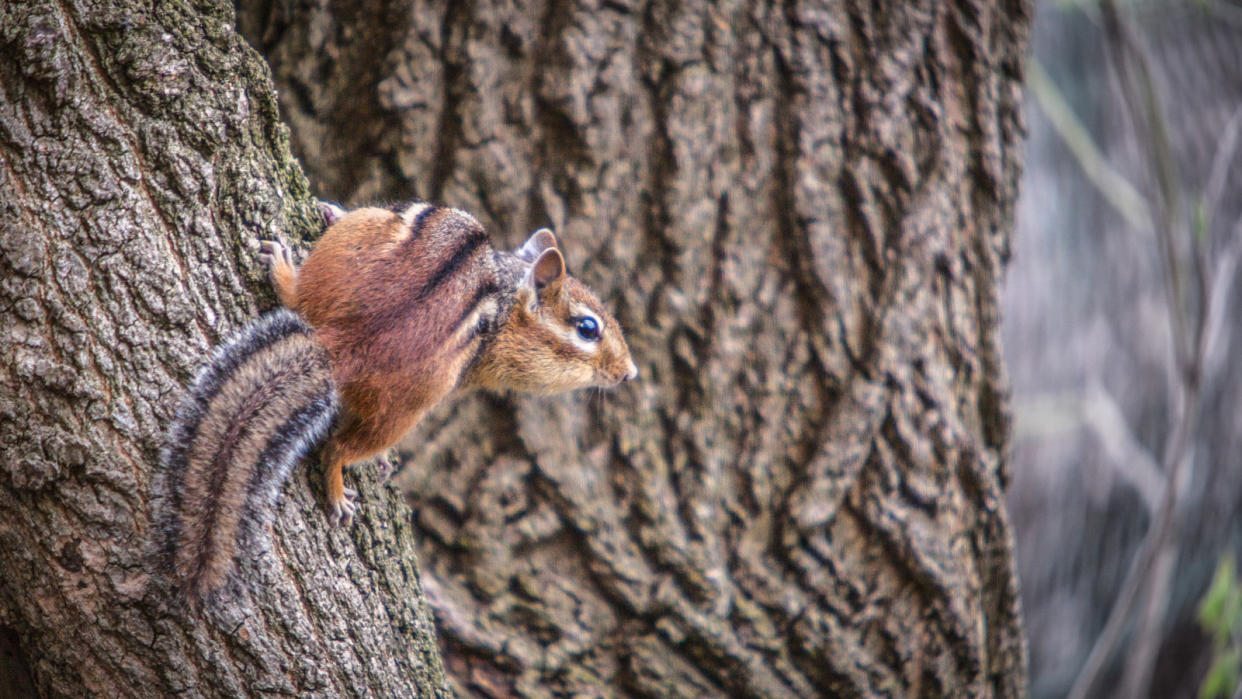How to Get Rid of Chipmunks

Chipmunks, while often portrayed as adorable, cheek-stuffing creatures in movies and cartoons, can be quite the nemesis for homeowners. If you've discovered a chipmunk infestation in your garden or home, you're probably seeking effective, humane ways to handle these small but mighty intruders.
Luckily, you can learn how to get rid of chipmunks by employing various methods, from the classic sunflower bucket method to less conventional tactics like using beach balls.
10 Humane Methods to Get Rid of Chipmunks
In your quest to reclaim your yard from chipmunks, it's essential to strike a balance between effectiveness and humanity; you don't need to kill chipmunks to clear them from your space.
There are several methods that are both kind to the animals and effective in keeping them at bay. Here are some of the most practical and humane strategies you can employ.
The sunflower bucket method: One of the most effective and humane ways to catch these critters is the sunflower bucket method. Fill a bucket with water and sprinkle some sunflower seeds on the surface. Position this near a ledge where chipmunks frequent. The unsuspecting chipmunk, lured by the seeds, falls in and can then be relocated. Ensure the water level is balanced — enough to prevent escape but not so much as to cause harm.
Live traps: Using live traps baited with foods that attract chipmunks, like sunflower seeds or fruit, is a humane option. Once trapped, you can relocate the chipmunk to a more suitable habitat.
Habitat modification: Reducing attractions like bird feeders high up, sealing pet food and removing wood piles or debris can deter chipmunks from settling in your yard.
Hot sauce: Mix hot sauce with water and spray it around your garden and lawn. Chipmunks hate the spicy taste, so they will steer clear. This method also works to repel other small rodents and animals [source: Willowbrook wildlife].
Cayenne pepper: Sprinkling cayenne pepper around plant bulbs and garden beds can repel chipmunks — again, because of their aversion to spice.
Bulb cages: Protecting your bulbs with cages prevents chipmunks from digging up the plants.
Plant-free gravel border: Creating a gravel border around gardens can deter chipmunks from crossing over into your plants.
Beach balls: Surprisingly, simply placing inflated beach balls in your yard can frighten chipmunks away. The movement of these balls, especially on windy days, creates an unpredictable environment that chipmunks tend to avoid [source: Willowbrook wildlife].
Predator urine: Using products that mimic the scent of predator urine can scare chipmunks away.
Electronic repellents: Devices that emit ultrasonic pulses can effectively prevent chipmunks from inhabiting certain areas.
Understanding Your Furry Foe: Chipmunk Basics
Gaining insight into chipmunk behavior is crucial when you're figuring out how to get rid of chipmunks or prevent a chipmunk infestation.
These small rodents, particularly eastern chipmunks and least chipmunks, are more than just cute faces; they're adept survivors known for their agility and resourcefulness. Here are some common chipmunk characteristics and habits.
Appearance and Diet
Chipmunks, recognizable by their dark brown stripes, are attracted to areas that offer abundant food. They're particularly drawn to bird feeders, gardens, and flower beds where seeds and bulbs are plentiful.
These critters are not picky eaters; their diet includes small insects, bird eggs, and various plant materials.
Burrowing and Nesting
Chipmunks are known for creating extensive underground burrows. (One of the big differences between chipmunks and squirrels is that the latter spend more time in trees.)
These burrows serve as their homes, food storage areas and safe havens from predators. The entrance to a chipmunk's burrow is usually well-hidden among ground cover or near retaining walls.
Recognizing Chipmunk Activity
To effectively get rid of chipmunks, it's essential to recognize signs of their presence. Here's what to look out for.
Burrow entrances: Chipmunk burrows are typically small and round, often found near food sources like bird feeders or in garden beds. Look for these burrow entrances hidden among tall grass, under garden sheds, or near debris piles.
Plant and bulb damage: Chipmunks have a fondness for flower bulbs and seeds, leading to gnawed bulbs and disturbed soil in your flower garden. They might also dig up small plants or nibble on young shoots.
Food pilferage: These critters might steal bird seed from feeders or find their way into rodent-proof containers. If you notice diminishing bird feed or disturbed pet food storage, chipmunks could be the culprits.
When to Call the Professionals
If the DIY methods don't solve your chipmunk woes, it may be time to consult a pest control expert. Professional exterminators have access to more potent rodent repellents and can offer customized solutions for chipmunk control, especially in cases of severe infestation.
When selecting a pest control service, look for companies that specialize in small rodents and offer humane, effective solutions. Inquire about their methods for dealing with chipmunks and ensure they align with your preferences, whether it's using live traps or granular repellents.
Reclaim Your Yard
Dealing with chipmunks can be challenging, but with these tips and techniques, you're well-equipped to handle these furry intruders. Remember, the key is to combine prevention with humane removal methods.
Keep your garden tidy, consider your bird feeder placement and try out some of the creative solutions mentioned. And, when in doubt, professional pest control companies are just a call away.
This article was updated in conjunction with AI technology, then fact-checked and edited by a HowStuffWorks editor.
Original article: How to Get Rid of Chipmunks
Copyright © 2024 HowStuffWorks, a division of InfoSpace Holdings, LLC, a System1 Company


